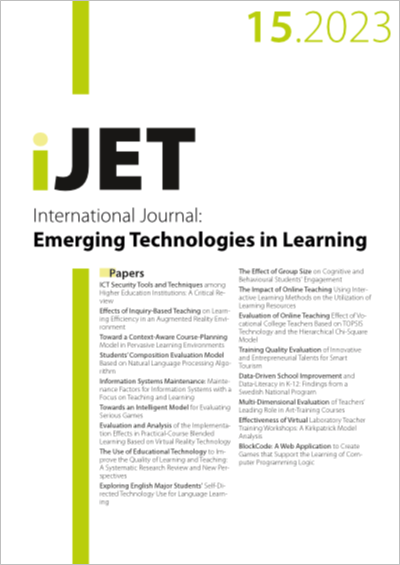Effects of Inquiry-Based Teaching on Learning Efficiency in an Augmented Reality Environment
DOI:
https://doi.org/10.3991/ijet.v18i15.41357Keywords:
AR, Inquiry-based teaching, Learners, Learning efficiency, Variance of analysis, Questionnaire technologyAbstract
Virtual reality (VR) creates a realistic learning environment to immerse users, meet scenario requirements and natural interaction of learning media, and offer learners a highly immersible virtual-real mixed environment. To analyze the effects of inquiry-based teaching on learning efficiency of learners in an augmented reality (AR) environment, a questionnaire survey was given to 278 undergraduates in 4 grades from 6 universities in Wuhan. Contextual learning theory and flow theory were used as the theoretical basis to analyze the effects of the four aspects of inquiry-based teaching on learning efficiency of learners in AR environments. Differences in learning efficiency caused by different degrees of familiarity of learners with AR equipment were measured using analysis of variance (ANOVA). Results show that Cronbach’s α of the questionnaire, which was developed based on existing research questionnaires, is 0.909 and the KMO value is 0.869, indicating that the questionnaire has very good reliability and validity. Posing problems, collecting evidence, and proposing explanations for an inquiry-based teaching mode have significant influences on learning efficiency of learners: under 5%, 1%, and 1% levels, respectively. The degree of familiarity of learners with AR equipment has significant influence on learning efficiency at the 0.01% level. Results herein provide important guidance for promoting the fusion of AR and teaching activities, enriching the application of scientific teaching with AR technology in universities, and designing and developing ways to use AR teaching resources in different disciplines.
Downloads
Published
How to Cite
Issue
Section
License
Copyright (c) 2023 Fengxuan Sun

This work is licensed under a Creative Commons Attribution 4.0 International License.



